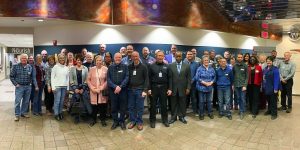
Everybody, especially in times of hardship or poor health, wants the opportunity to talk about the things they hold in their heart – the joys, the hopes, and even the fears – according to Pastor Paul Winkler of Zion Lutheran Church in Rapid City. “The human is more than just body – we’re also mind and spirit,” he said. “Providing emotional support to patients and their families can really improve the experience for everyone.”
Pastor Paul is one of 45 community clergy members who gathered at Rapid City Hospital last month to learn about Monument Health’s Spiritual Care Services program. The goal of the program, led by Sandra Ogunremi, DHA, Manager of Spiritual Care Services, Diversity & Inclusion, is to provide spiritual support to patients through both community members and caregivers/providers who are credentialed clergy. It is active at Rapid City Hospital now, and the hope is to expand it to all Monument Health hospitals.

“This is a priority for us because we know there’s a direct correlation between spiritual care and patient outcomes in terms of how quickly someone can recover, readmission rates, patient satisfaction and more,” Sandra said. As an ordained minister through U.S. Assemblies of God, she knows from experience and from research that when people need to seek care, they usually experience a lot of fear. “Even though they may trust their physician completely, a lot of people want reassurance and want to turn to a higher power to help them through those situations,” she said.
The World Health Organization defines health not only as the absence of disease, but a state of physical, mental and social well-being. Jason Lambert, Manager of Patient-Centered Design, said spiritual care is a foundational component of providing a caring experience for Monument Health patients. “Left unaddressed, unmet spiritual needs can manifest in many ways such as anxiety, depression and confusion and can often lead to other maladies – all avoidable forms of suffering,” Jason said.
Community clergy members who provide spiritual care go through all necessary training and receive a Monument Health identification badge. They are also invited to attend monthly meetings to receive tools and education and give feedback about how the program is going. Clergy are encouraged to provide spiritual support to any patient who wants it, regardless of their faith background. Sandra’s long-term goal is to have enough volunteers to be able to provide 24/7 coverage.
Internal caregivers are encouraged to get involved in this effort as well. “If you identify a spiritual need on your floor and you feel comfortable filling that need, we encourage you to do that,” Sandra said. Caregivers can also sign up as volunteers to provide this service outside of work. Contact Sandra Ogunremi for more information.
Pastor Paul has been visiting Zion Lutheran parishioners at Rapid City Hospital for over nine years. “I’d like to extend my appreciation to the administrators and caregivers at Monument Health for seeing the importance of this and also for being so welcoming,” he said. He added that he is happy to provide some assistance to health care providers, who have such busy jobs. “They’re incredibly caring people who do such wonderful work, but they have a huge responsibility. It’s important to me to support them if I can.”
Thank you to all of our volunteers and caregivers who provide spiritual support to patients and families.